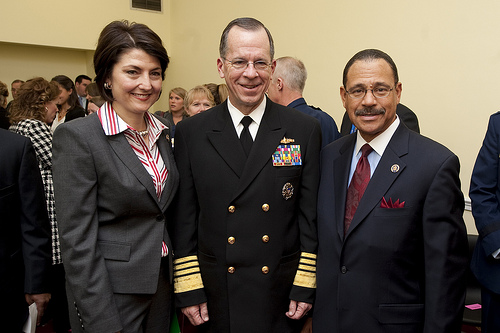


Rep. Cathy McMorris Rodgers (R-WA), left, was selected by the Romney campaign to represent the GOP presidential platform at the September 28 National Forum on Disability Issues in Columbus, OH.
This past Tuesday, the National Forum on Disability Issues posted downloadable transcripts and video footage from its September 28 event in Columbus, Ohio. While both President Obama and Governor Romney declined the invitation to join the discussion personally, each candidate sent an emissary who purportedly spoke for their party’s respective positions on health care, education, accessibility, and employment, among other issues related to Americans with disabilities.
Since Romney has yet to make any official statements regarding how people with disabilities would fare under his leadership, more pressure was probably on Rep. Cathy McMorris Rodgers (R-WA) than Obama’s delegate, Edward M. “Ted” Kennedy, Jr. But she was probably the best choice out there to speak to these concerns. In addition to being the mother of a five-year-old son who has Down syndrome, McMorris Rodgers founded the Congressional Down Syndrome Caucus in conjunction with Rep. Patrick Kennedy (D-RI) and chairs the Disability Caucus, the Congressional Neurosciences Caucus, and the Congressional Military Family Caucus. All of which have a mission to help individuals with disabilities advance in our society.
McMorris Rodgers spoke at length about employment opportunities for people with disabilities in her opening remarks, acknowledging current labor statistics and the desire to make life matter more for these individuals through policies that emphasize inclusion and independence. She called the Americans with Disabilities Act (ADA) and the Individuals with Disability Education Act (IDEA) “milestone achievements,” but cautioned that “the disability community have not realized the full promise intended by these laws,” largely because of implementation problems brought on by government bureaucracy (a point acknowledged by the GAO this summer), explaining:
… [W]e’re presented with a bewildering array of agencies and programs that often work at cross-purposes. The implementation of A.D.A. and IDEA has occurred across the antiquated systems of Social Security, Medicaid, VOC rehab and others. These programs were designed long before the concepts of A.D.A. and IDEA. It’s like trying to go to the moon in a Model T.
Not surprisingly, McMorris Rodgers said the federal government can learn what works from the private sector, pointing to Walgreens’ success in hiring people with disabilities to perform many of the light assembly, sorting, packing, and shipping duties in its distribution centers, as well as Walmart’s recent adjustments to store layouts in order to better accommodate individuals with disabilities.
McMorris Rodgers also praised those states that have instituted “Employment First” initiatives for working-age adults with disabilities. Her home state of Washington is one such state, as is Massachusetts. Before closing with a call to have people with disabilities included in any future job plans proposed by the federal government, she underscored how working makes life matter beyond the weekly paycheck, saying, “Think about it. When you meet a person for the first time, there are two questions that you ask. What is your name, and then what do you do?”
Here is the video of McMorris Rodgers’ opening remarks. We’ll get into the Q&A portion of her presentation tomorrow. Share any of your thoughts in the comment section below.
Image by Chad J. McNeely (Chairman of the Joint Chiefs of Staff).